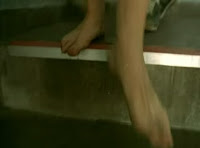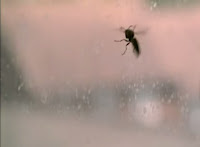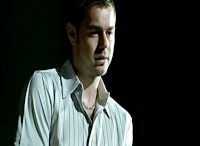Andrea Arnold was born and raised in Kent, England. Studying at the American Film Institute of Los Angeles, her ambition for film making started at a very young age. The movie solely focuses on a mother struggle to provide for her family, coping with local people's perception of her and wanting to live her own life somewhere inbetween.

 The film opens showing a family rushing down several flights of stairs, the mother being bear footed carrying a baby that is bear footed and three daughters that wearing scruffy clothing. It can be implied either way that the family was simply just in a rush to get to wherever they need to be, but as the film develops, it is made very clear that this family is not very financially secure and can not even provide the most basic things needed for a comfortable life. When the mother finally arrives at the place she needs to be, she's finally greeted by another woman to which the mother opens with 'You bitch'...'fuck with my kid!'. This is seen as an act of pure rage and anger as the audience have seen this mother drag her children all the way to this house because this mother wanted to start a fight, but arguably for a morally correct reason, to defend her own child, but going about it in a very wrong way. Allowing her own children to see their mother act this way is a good way of presenting the character of not being able to make good decisions, which reoccurs throughout the movie.
The film opens showing a family rushing down several flights of stairs, the mother being bear footed carrying a baby that is bear footed and three daughters that wearing scruffy clothing. It can be implied either way that the family was simply just in a rush to get to wherever they need to be, but as the film develops, it is made very clear that this family is not very financially secure and can not even provide the most basic things needed for a comfortable life. When the mother finally arrives at the place she needs to be, she's finally greeted by another woman to which the mother opens with 'You bitch'...'fuck with my kid!'. This is seen as an act of pure rage and anger as the audience have seen this mother drag her children all the way to this house because this mother wanted to start a fight, but arguably for a morally correct reason, to defend her own child, but going about it in a very wrong way. Allowing her own children to see their mother act this way is a good way of presenting the character of not being able to make good decisions, which reoccurs throughout the movie.The eldest daughter, Kelly, reacts to the confrontation with 'My mom looks like Victoria Beckham you fowl cow!' and after the fight is over and the family is presumably walking back home the mother says to Kelly 'Don't say that thing about me looking like Victoria Beckham again okay?' 'You said it, not me'. This implies that the mother has fantasied about herself being Victoria Beckham, with all the money and fame and nice husband, heavily suggesting that she has big, yet unreachable dreams for herself. Telling Kelly not to repeat it again further connotes that she recognises how unrealistic these dreams are and to even speak of them out loud somehow taboos the "spell" and destroys her dreams.
 In the next scene we are introduced to David, who is established as an ex boyfriend of the mother. it is very clear that she intends to join David for a drink at the pub, but the ever present look of guilt on her face as she looks back at her vulnerable children lingers in the back of her mind. One wide shot in particular shows a dog prowling in the background of the children, connoting themes of the children being surrounded by danger, which can later foreshadow what surrounds them later in the film when they're left alone outside the pub.
In the next scene we are introduced to David, who is established as an ex boyfriend of the mother. it is very clear that she intends to join David for a drink at the pub, but the ever present look of guilt on her face as she looks back at her vulnerable children lingers in the back of her mind. One wide shot in particular shows a dog prowling in the background of the children, connoting themes of the children being surrounded by danger, which can later foreshadow what surrounds them later in the film when they're left alone outside the pub.

The family is next scene in the kitchen where the mother is looking to prepare food for the family, looking through near empty cereal boxes and moldy bread, whilst her children watch saddened in the background. There is a substantial feel of melancholy over this scene as while the children watch with sad faces, the mother calls a friend to talk about her encounter with David, stating before that she 'don't have much credit'. This supports evidence towards this mother not being fit to care for her children as instead of calling for help from family or even the friend she's talking to for help with food/money, she's talking about a date which she can't even be close to affording. Later in the scene a close up on a Wasp trying to get outside can be very symbolic of the mothers's current situation as she is also fragile and trapped behind the glass (poverty), but she needs someone else to help her escape (open the window) for her to be free. This message only announces itself to her at the end of the movie, shortly after it nearly endangers her newly born child.
A little while after the family arrives at the pub and it slowly turns dark, the children are seen running around in puddles, not being looked after and being left to their own devices. Not only does the audience further loose sympathy for the mother and her issues, but they further sympathise with the characters of the children, which is especially effective towards the climax of the film when the children spot a group of men holding bags of chips. Several close ups of insects fluttering around rubbish along the car park of the pub symbolises the children's current situation. Similarly to the mother and the Wasp, the moth and butterfly symbolise these fragile beings simply existing in the world, not making any major impacts, or in a endangered position, but they're just simply there with no purpose. A combination of starvation and lack of common sense, as a result of the mother, resorts them to eating the food, even giving the food to the new born baby, meanwhile the mother is in the car with David, within sight of the children, alluding to having sex together.


As the night comes to a close, a Wasp finds its way to the youngest child and slowly crawls its way into the child's mouth. This causes the girls to scream and the mother in hearing this, runs to them. The severity of the baby almost dying finally makes the mother realises that she can't cope with all of her problems on her own, and the audience is left with some hope when David finds them all helpless together.

No comments:
Post a Comment